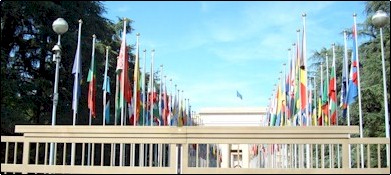
SOITM participates in the sessions of expert Mechanism
on the Rights of Indigenous Peoples
|
Expert
Mechanism on the Rights of Indigenous Peoples
Council of Human
Rights
2nd Session
10th – 14th August 2009
Switzerland – Geneva
Agenda
Item 4a: Implementation of the Declaration at the regional and national
levels
Date: 4
August, 2009
No: Sta.18-H0409
Title: Urgent need to address Human Rights Abuses of Indigenous populations in
Northern Iraq
Mr. President, Excellencies, Ladies and Gentlemen,
Iraq is currently facing a challenging
chapter in its history. Establishing and enforcing rule of law, maintaining
security and stability and ensuring the fundamental rights of its people,
particularly the Indigenous peoples are protected are not easy tasks to
achieve. Despite the relative stability established in northern Iraq, there
remains a bleak human rights situation in the region that requires the urgent
attention of the UN Human Rights Council.
Sectarian conflict, extreme nationalism and a lacking
democratic norms have hampered the reconciliation process in Iraq, particularly in northern Iraq. A state
of insecurity after occupation has lead to a significant deterioration of human
rights conditions of the indigenous populations of Iraqi.
Northern Iraq is a country with a mosaic of
multi-ethnic and multi-religious communities. It consists of Arabs, Kurds,
Turkmen, Chaldea-Assyrians, Yazidis and Shabaks. The non-Kurdish communities
make up the majority of the population. Following the invasion of Iraq, the
region was ruled by occupation forces and Kurdish Peshmerga militias. The
subsequent administration established in northern Iraq has been disproportionally
dominated by Kurdish authorities.1
Non-Kurdish groups are consistently alienated from political dialogue, with
demographic and electoral manipulation having resulted in increased Kurdish
domination of the region.2
The mass in-migration of Kurdish families to regions, which
have been historically populated by Iraqi indigenous populations, resulted in
the increased marginalization of non-Kurdish populations, including the
Turkmen, as well as significant demographic changes in the region. The peoples
have since been subjected to assimilation policies, targeted violence and
harassment.
Reports continue to indicate that non-Kurdish communities,
their politicians and activists are being suppressed, intimidated, arrested,
abused and in some cases executed.3 Some examples include:
Relating to those of Arab ethnicity, Dr. Sabri
Aba Al-Jabbar, from Kerkuk, spoke out against Article
140 and was subsequently kidnapped and killed in late October 2007.4
Relating to the Turkmen, on 27 May 2009, Mr. Saleh Ibrahim was kidnapped by the security agents
(Asayish) of KUP. He was exposed to severe torture before he was rescued. On 29
May 2009, Mr. Istabraq Yazaroglu’s
home in Taze Khurmatu was subjected to gun shots. Yazaroglu is deputy of the chief of Turkmen Student Union.
He played important role in defending Mr. S. Ibrahim. On 1 June 2009, a Turkmen
shop was shot by Kurdish police Colonel Abdullah Kadir
and his guards. Four were severely injured, the condition of two of them was critical.
On 14 May 2009, two Turkmen were shot in the city of Tuz Khurmatu. Mr. Alaa Sabir Mecid
was killed and Mr. Abd al-Hadi
Kalandar Shahbaz was
injured.
Regarding the Chaldeo-Assyrian community, they are
frequently exposed to attacks and intimidations in the areas where the Kurdish
soldiers dominate.5
The Shabaks of Nineveh face oblivion as a people, targeted
politically by Kurdish authorities with claims on their land.6 Mr. Kadhim Abbas, from Shabak minority, who was a fierce opponent of
the recent demographic changes in Mosul, was killed at July 13th, 2008.7
Yazidi politicians who are disloyal to the Kurdish
authorities are unable to visit their constituencies for fear of assassination.
Many Yazidi politicians and activists have been arrested, persecuted and
intimidated. Relatives of the Yazidi activists out of Iraq are arrested and intimidated.8
These brutal actions go un-investigated and un-challenged by
Iraqi Government authorities, United Nation Office and International human
rights organizations. As such we are asking the United Nations to increase
their attention and action against human rights abuses in northern Iraq.
Mr. President, while we recognize the harsh challenge of
monitoring human rights in current-day Iraq it should be said that it is
vital to remain vigilant about human rights situations when peace and stability
are at their worst. Therefore in view of the above stated information, we urge
the UN Human Rights Council to:
·
Increase its monitoring of the human rights situation in
northern Iraq,
including:
o
increased communication and bilateral cooperation between
the Office of the High Commissioner for Human Rights and Iraq;
o
Establishment of UNAMI offices in Mosul
city, Nineveh
plain, Tuz Khurmatu, Khanaqin and Mendeli regions
·
Call upon all relevant Special Procedures Mandate Holders to
include the following concerns when reporting back to the UN Human Rights
Council in relation to the situation in Iraq:
o
Adequate representation of all ethnic and minority groups in
regional administrations;
o
Impartiality of all police and military bodies in northern Iraq;
o
Adequate consideration for all concerns brought forward by
relevant stakeholders, including all ethnic groups such as the Turkmen,
Chaldea-Assyrians, Yazidis, Shabaks and Arabs.
_________________________________
1 SOITM report entitled “US-made Kerkuk
City Council
decides once again in favor of the Kurds”,
http://members.lycos.nl/soitum/USA-madeKCP.pdf
2 “Letter of a Group of 12 Iraqi
Community Leaders”, http://members.lycos.nl/soitum/ThBa1.pdf. and, Iraqi Turkmen Front Elections Committee, http://www.turkmen.nl/1A_soitm/ITFEC.doc
3 Shamiran Mako, “The Current Situation of the Indigenous Assyrians of
Iraq”
http://www2.ohchr.org/english/issues/minorities/docs/11/Assyrian_3a.doc
4 Aljeeran, website
of the association of Iraq
and Kuwit, “Ignored by Kurdish political parties, the
inhabitants of the Kerkuk attends the condolence ceremony of Abd al-Sattar Tahir
Sharif”, 7 March 2008,
http://www.aljeeran.net/wesima_articles/reports-20080307-98907.html
5 Assyrian International News Agency,
“Kurdish Involvement Suspected in Attacks on Assyrians in Mosul”, 10-17-2008,
http://www.aina.org/releases/20081017000537.htm
6 BBC interview with Hunain al-Qaddo, “Crushing Iraq's human mosaic”, July 2007,
http://news.bbc.co.uk/2/hi/middle_east/6293230.stm
7 SOITM Foundation, “To the
international community: The Iraqi people are in severe need of your help”, 13
July 2008, http://www.turkmen.nl/1A_soitm/PR.20-G1308a.doc
8 SOITM Foundation, “Kurdish
authorities and Iraqi Indigenous populations: the suppression of Iraqi
Yazidis”, 27 October 2008, http://www.turkmen.nl/1A_soitm/Rep.29-J2708.doc
|